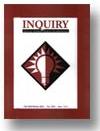Critical thinking and decision-making are closely related and nearly go hand-in-hand. Although it may not be evident that these two processes are used on a daily basis, they clearly are. Whether you realize, or not, that you exercise these two processes, for example professionally or socially, at some point during every day, you contemplate your thoughts, you observe others and their actions, and rule on many subject matters. Many do this subconsciously, but in the end, it comes down to you building on your critical thinking and making decisions.
Critical thinking is the closely controlled ability and eagerness to evaluate evidence and claims, to make impartial judgments on the basis of well supported reasons as a guide to belief and action, to seek a width of contradicting as well as confirming information, and to monitor one's thinking while doing so. The thinking 'process' that is appropriate for critical thinking depends on the information area (e.g.
scientific, mathematical, historical, etc.) but some universal measures are: clarity, accuracy, precision, consistency, relevance, sound empirical evidence, good reasons, depth, extent and fairness. All in all, critical thinking is the process some refer to as "thinking outside of the box", which takes practice.
Decision-making is a process where people consider the costs and benefits of alternatives. Some steps in the process include defining the problem, gathering information, exploring alternatives (or thinking 'critically' about options), making the decision, taking action, and evaluating the decision, after it has been made. In a typical organization, the department head usually reaches the ultimate say in a decision. Although, this does not mean that only the highest authorities can finalize a decision. Through my past professional experiences, when working in teams, the department head or supervisor, has been able to pass down their authority, if they wish to do so,


